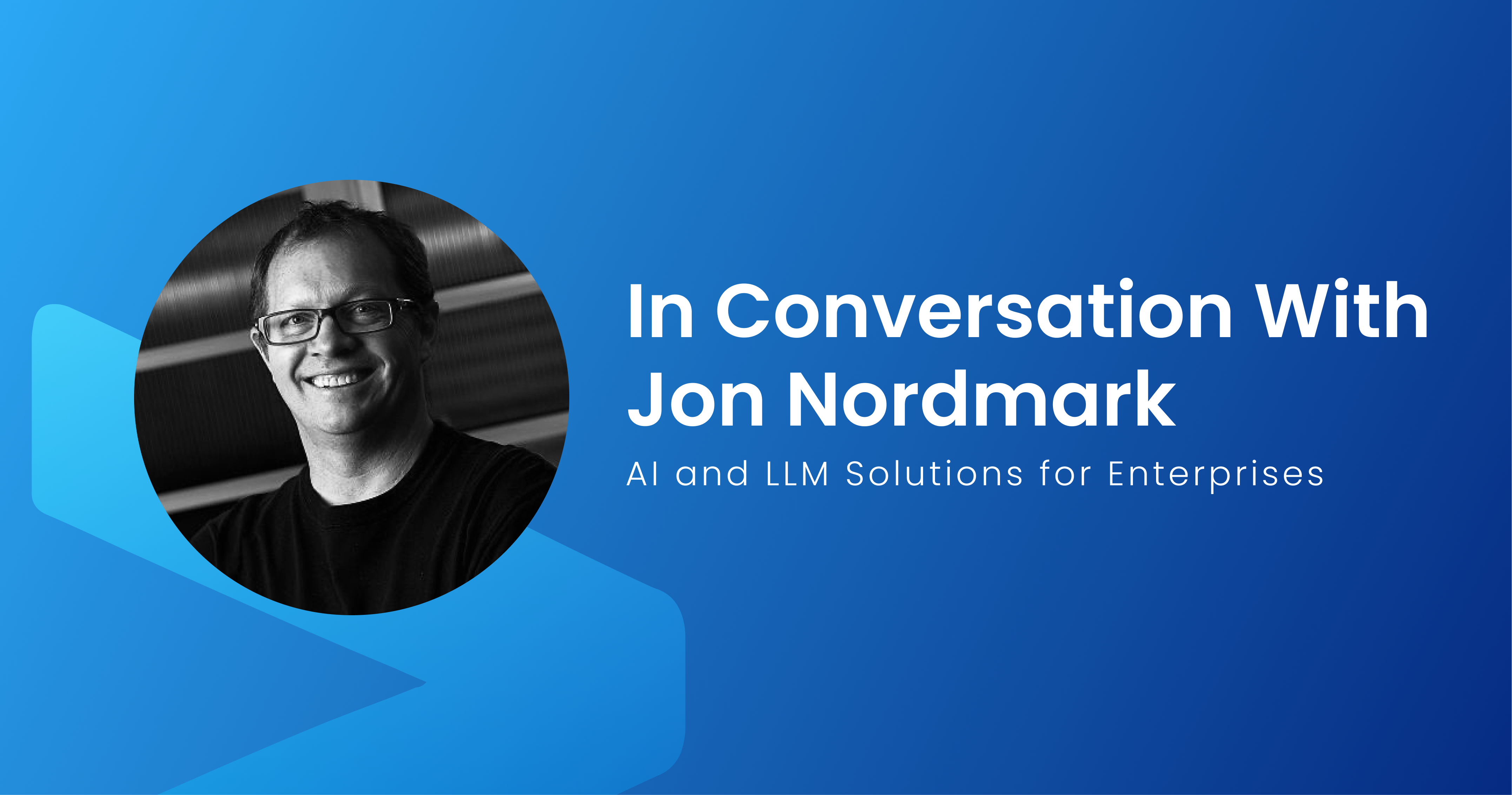Ahmed Muzammil, VP of Engineering at Gaper.io sat down with Jon Nordmark, CEO and Co-Founder at Iterate.ai for what was an illuminating discussion about LLMs and their use cases for enterprises.

Ahmed Muzammil, VP of Engineering at Gaper.io sat down with Jon Nordmark for what was an illuminating discussion about LLMs and their use cases for enterprises.
Jon is the co-founder and CEO of Iterate.ai. In its first year in 2017 (known as Iterate Studio back then), the company built a low-code platform that accelerated the development and implementation of emerging technologies of which AI was one. Back then, AI was still a new technology in the enterprise environment, but Jon and his team realized that the technology would grow and make its place in various markets, especially in the IoT domain. This ended up being great foresight and proved fruitful once the AI boom took over the tech world.
With around 15% of their team constituting AI experts, nearly all of the work that Iterate.ai now does revolves around artificial intelligence. IoT still makes up for some of this work but their clients now include some of the biggest enterprises in the US, all of which are setting their eyes on generative AI now. Iterate.ai provides enterprises with AI-led customized development solutions and capabilities on their local platform that they build and own.
“AI is not the metaverse…it’s not the crypto craze”.
But that doesn’t mean that these technologies are dead. OpenAI’s CEO Sam Altman launched a cryptocurrency project called World Coin only last month. While these worlds could still continue to grow and emerge – and Jon thinks Roblox and Facebook’s vision have a lot more growing to do – AI is in a different league. It is all-encompassing and touches almost every business and everyday use case out there.
Jon notes that generative AI has exploded and it’s not even been a year since it grabbed mainstream attention. Generative AI is now an everyday tool for everyone from middle school kids to professionals in senior roles…unless you’re laying asphalt as a construction worker.
AI will keep going.
Selling to an enterprise is a different beast than working with startups.Iterate.ai has the advantage of being largely being bootstrapped. This allowed them to operate with patience, something that’s often needed when working with enterprises.
A lot of Iterate.ai’s enterprise clients offer a look at interesting and unique use cases. For example, they have been operating a Pay with License Plate which combines IoT and computer vision technologies to provide a touchless and frictionless AI solution for convenience stores where customers’ phones act as a payment gateway.
Another one of their use cases involves doing inventory of hot dogs, beer, and coffee cups while working with a dynamic to-do list and existing cameras.
Another one of their solutions involves AI for Quick Service Restaurants that are customized for every branch of an establishment that was their client. They use Large Language Models (LLMs) to have a conversation with fast-food restaurant customers. Customers can get suggestions, pricing information, and the model will even remember your previous orders. This also incorporates the solution where customers could turn their license plate into a credit card.
These solutions and use cases are very unique in the sense that they use AI to help physical businesses to upgrade their systems using existing data even though the general trend in the market is largely centered around the digital world. Iterate.ai is focused on building private LLMs to do internal research by combining external LLMs with internal data to create a research repository for finance and marketing teams.
Iterate.ai’s applications and solutions also incorporate privacy features. AI can be processed at really high speeds so their low-code platform operates on any cloud, private environments, and Edge devices. This substantially decreases response latency as well to allow for a more human-like, instant answer from the model.
Iterate.ai’s expert and experienced technical teams befit the advanced and complex tech that the company develops for its clients. Three people from their team were part of the engineer and development cohort that helped invent the very first iPhone. This allows Iterate.ai’s tech team to modify the most basic parts of software at the kernel level to improve processing and response times, something that’s key for LLMs operating in private environments.
Apple does not want its employees working with LLMs because they want to preclude the possibility of anyone writing private, company information as a prompt. This problem led Samsung to ban the use of Generative AI amongst its employees earlier this year as well.
Iterate.ai seeks to prevent this for its clients by building more private LLMs for companies.
Now, building LLMs comes to no small cost. Couple that with the fact that Iterate.ai has not received any major funding from VCs, it is incredible to note that the company has hit $10 million in revenue.
Jon credits this success to the stellar efficiency of his team which operates without the kind of sales and marketing efforts that other startups resort to.
Software engineers have been their biggest investment and it is paying off well.
There is this belief in the startup community that Jon is a part of whereby constraints lead to the most inventive work. In an older startup that Jon started called eBags.com (acquired by Samsonite), he shared that the team believed that “too much money makes us stupid”.
Using open-source code and partnering up with big companies has allowed them to remain incredibly cost-effective where they can increase their development times by a whopping 17x.
As we step into a future with more AI-led developments and innovations ready to fold, the demand for AI experts and engineers will also see an uptick. Hire vetted AI engineers and experts from Gaper.io today.
Top quality ensured or we work for free
